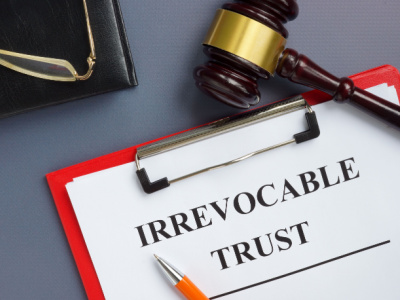Tag: Naperville estate planning attorneys
How Can Law Firms Build and Maintain Trust With Clients?
Posted on October 26, 2023

Building trust is crucial for any law firm. It forms the foundation of a strong attorney-client relationship, which is essential for successful legal representation. When clients trust their lawyers, they are more likely to be open and honest about their situation, follow the advice provided, and feel confident that their legal needs are being met. A trusted attorney can help clients address their estate planning needs, ensuring that they understand how to protect their assets and plan for the future. Some methods of building trust between an attorney and their […]
When Should Irrevocable Trusts Be Used in an Estate Plan?
Posted on October 13, 2023

An estate plan is a crucial part of ensuring that your assets are distributed according to your wishes after you pass away. One tool commonly used in estate planning is the irrevocable trust. Unlike a revocable trust, which can be modified or revoked at any time, an irrevocable trust cannot be altered once it has been established. If you are considering the best ways to protect your assets and make sure your wishes will be followed correctly, an attorney can provide guidance on how irrevocable trusts and other estate planning […]
Estate Planning Strategies for Blended Families
Posted on October 4, 2023

In a blended family, a couple will have children from one or both of the spouses’ previous relationships, and they will form a new family unit. These types of families are becoming more and more common in today’s society. While blended families can find joy and fulfillment as they form new bonds, they may also face unique challenges when it comes to estate planning. In these situations, spouses will need to carefully consider the strategies they may use to ensure that their assets are distributed according to their wishes and […]
Understanding the Role of Power of Attorney in Estate Planning
Posted on September 29, 2023

Regardless of your age, estate planning is an essential part of preparing for the future. A comprehensive estate plan can help ensure that your affairs will be managed correctly and that your assets will be used and distributed according to your wishes. Powers of attorney (POA) are one important tool that may be used in your estate plan. These legal documents will grant someone else (your “agent”) the authority to act on your behalf in financial, legal, or medical matters. As you determine how to use powers of attorney, an […]
What Role Does Life Insurance Play in Estate Planning?
Posted on September 21, 2023

Estate planning can ensure that your assets will be distributed to your heirs according to your wishes after you pass away. When you create an estate plan, you will make important decisions about how your property, finances, and personal belongings will be managed and transferred to your loved ones. During the estate planning process, many people will focus on creating a will or establishing trusts. However, life insurance is an often overlooked but crucial aspect of estate planning. An attorney who understands how to address complex legal issues related to […]
What Are the Options for Asset Protection in an Estate Plan?
Posted on September 14, 2023

An estate plan is a crucial tool that allows people to protect their assets and distribute their property according to their wishes after they pass away. However, when you create an estate plan, you will not just be concerned about distributing your assets. You will also want to take steps to protect your assets during your lifetime. Asset protection is an essential aspect of a comprehensive estate plan, especially especially for those who have complex estates. By working with an experienced attorney, you can take steps to safeguard your hard-earned […]
Estate Planning Considerations for Family-Owned Businesses
Posted on September 5, 2023

When it comes to estate planning, family-owned businesses have their own unique set of considerations. By addressing these issues, a business owner can help ensure the smooth transition of a family business from one generation to the next while also minimizing their tax burdens. If you own a family business in DuPage County, it is important to understand these considerations and work with an experienced attorney who can assist with business succession planning and other related concerns. Why Estate Planning Matters for Family-Owned Businesses Estate planning involves making arrangements regarding […]
What Types of Charitable Trusts Can Be Used in an Estate Plan?
Posted on August 29, 2023

A well-crafted estate plan will not only ensure the smooth transfer of assets to a person’s loved ones after they pass away, but it also allows them to leave a lasting legacy through charitable giving. Charitable trusts are powerful tools that can be utilized as part of an estate plan, and they can not only benefit charitable organizations, but they can also help a person and their family meet their own financial goals. For those who are considering how to incorporate charitable giving into their estate plan, an experienced attorney […]
When Should I Update Beneficiary Designations in My Estate Plan?
Posted on August 23, 2023

Planning for the future is an essential part of life, and this includes creating an estate plan. Your estate plan will determine how different types of assets you own will be allocated among your heirs. This can help you make sure your family members and other loved ones will have the resources they need in the future. However, it is crucial to regularly review and update your estate plan, especially when it comes to beneficiary designations. The Importance of Beneficiary Designations In an estate plan, beneficiary designations specify who will […]
How You Should Update Your Estate Plan After Getting Divorced
Posted on August 16, 2023

Divorce is a significant life event that can have a major impact on your estate plan. It is crucial to review and update your estate planning documents after getting divorced, especially if you are someone with a high income or extensive assets. By addressing the following issues, you can make sure you will be prepared to address the concerns that you and your family may encounter in the future: Updating Beneficiary Designations Following a divorce, it is important to revisit the beneficiary designations specified in various financial accounts and insurance […]














